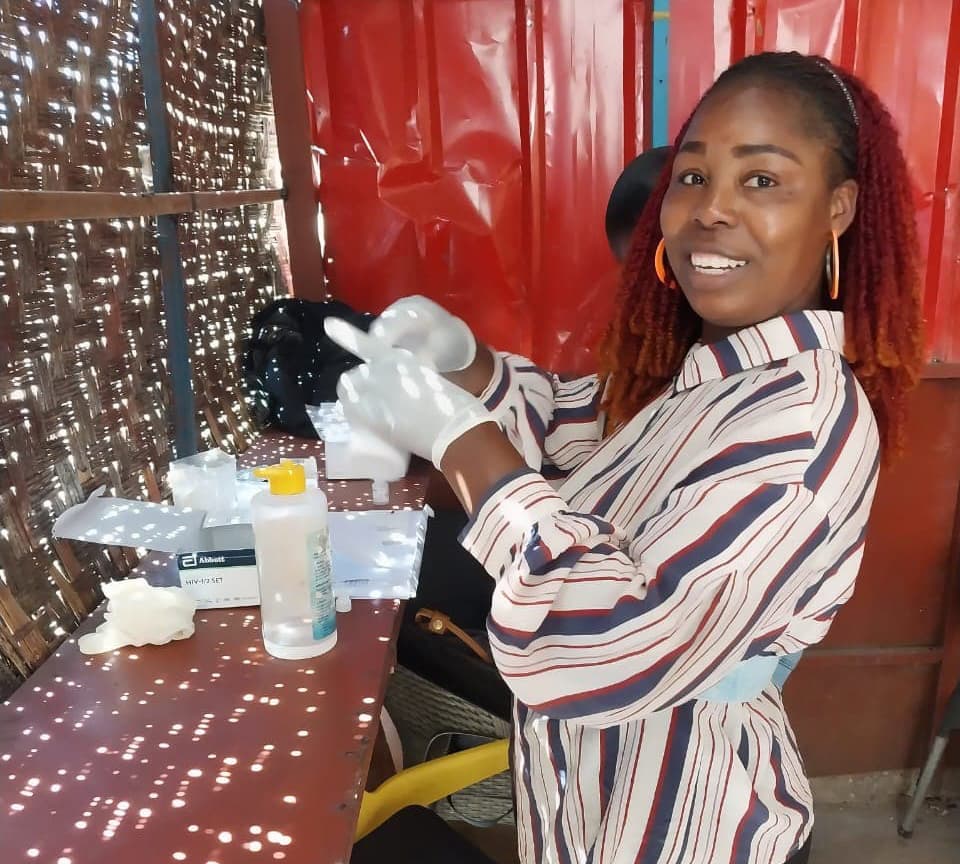During an antenatal care visit in Luanda, Angola’s capital, Laurinda, a 39-year-old mother, tested positive for HIV. The diagnosis devastated her. But, Laurinda took the next step to preserve her health and safeguard the health of her children. Four months pregnant, she immediately began antiretroviral treatment (ART).
However, adhering to treatment proved challenging. After Laurinda gave birth to twin girls, her partner passed away. Then, her mother-in-law evicted her and the twins. Laurinda was overwhelmed. “I abandoned treatment because the difficulties I was facing were too many,” she said. “I would go more than 24 hours without eating anything and I did not have a job, and, therefore, I had no money to get to the health facility.”
Laurinda’s situation highlights how difficult family circumstances can impact a person’s ability to maintain lifesaving health treatments. However, with support from the U.S. President’s Emergency Plan for AIDS Relief (PEPFAR) through the U.S. Agency for International Development, the Reaching Impact, Saturation, and Epidemic Control (RISE) project in Angola is helping families like Laurinda’s find a pathway to consistent HIV care and a healthy life.
After months of struggling, Laurinda found the courage to contact her Aunt Augusta, a traditional birth attendant (TBA) who lived in Huambo. She helped Laurinda move back to her hometown when the twins were 10 months old. Augusta had recently attended a meeting convened by RISE Angola to foster a referral partnership between RISE HIV community counselors and TBAs to ensure that newborns are tested for HIV if their mothers didn’t get proper antenatal care. Early diagnosis of infants has been a challenge in areas of Angola, as has ensuring that children living with HIV receive treatment. According to UNAIDS (2022), around 310,000 people in Angola live with HIV/AIDS. However, ART coverage is insufficient, reaching only 49% of adults and 22% of children who need treatment.
Based on what she learned at the meeting, Augusta knew that Laurinda’s twins could be at risk for HIV since their mother was not on treatment, and the twins had not yet been tested for HIV.
Augusta referred her niece to RISE HIV community counselor Amelia Nafulo Kuyungo, who had just been trained in dried blood spot (DBS) testing, which is used to test infants for HIV. The training is part of a pilot project between RISE Angola and the National HIV and AIDS Institute. Implemented by RISE consortium partner ICAP, the project enables DBS samples to be collected by lay counselors like Amelia directly in communities rather than only in hospitals or laboratories. Huambo was selected as the pilot because its coverage of early infant diagnosis was just 36 percent, the lowest of the four provinces supported by PEPFAR. A month after the pilot began in April 2024, 29 samples from infants had been collected in the community, 24 (82 percent) were from infants less than two months of age.
At the end of April, Amelia traveled to Laurinda’s home and collected the DBS samples from her twins. She also took Laurinda to CS Benfica Baixo, one of the four ART health facilities in Huambo supported by PEPFAR, to re-initiate ART. Given the precarious economic conditions in which Laurinda was living with her children, RISE also provided food baskets for the family and advocated for more support from the provincial public health team. By the end of May, the test results for the twins came back negative, bringing immense joy to the family and their community of supporters.

“The help that I am receiving now means a lot to me,” Laurinda said. “I really do not have words to express my gratitude. The food baskets have allowed me to introduce the twins to other foods and minimize their exposure to the virus [through breastmilk].”
The DBS samples from Laurinda’s twins were the fourth and fifth samples Amelia had collected after her training.
“It is a huge responsibility, but I do it happily,” Amelia said, reflecting on her DBS work. “Some of the infants are from mothers who I have been supporting since early in their pregnancies, so being able to now offer DBS to them is great because it gives me more autonomy to ensure that mother and child are well taken care of. I now can address the common problem that many mothers have, which is the lack of money to get to and from a health facility to bring their infants in for testing before they turn two months of age.”
Through RISE Angola, Amelia will continue to support Laurinda and her twins until the twins are 18 months old and Laurinda’s health has stabilized.
RISE Angola, the National HIV and AIDS Institute and PEPFAR’s laboratory partner, AFENET, meet twice a month to monitor the results of the pilot project, which is expected to last through September 2024. Based on the results and lessons learned, RISE Angola hopes to expand the pilot to other provinces.
“The joy that I feel when I find four- and six-week-old babies who need our support fills me with pride,” Amelia said. “I am convinced that we will continue to find and help many more.”



